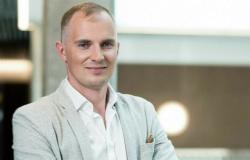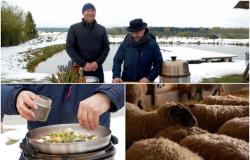The need for a sustainability leadership position arose for several reasons
At the end of last year, the Vilnius city municipality announced that the former mayor Antonas Nikitin, who held the position of engineer, will take the position of head of sustainability from now on. According to municipal specialists interviewed by the “Sustainable Lietuva” initiative, the position was created in order to systematically shape the approach to the city in terms of sustainability, and the work also increased after Vilnius became the green capital – one of the 100 European cities striving for climate neutrality.
“The municipality and its subordinate companies pay a lot of attention to ensuring environmental protection, social responsibility and corporate governance (ESG) standards. We needed a coordinator of sustainability initiatives and activities in order to move more smoothly and systematically towards the goals of sustainable development – both at the level of the city, the group of companies, and the organization,” commented Vilnius City Municipality specialists on the “Sustainable Lietuva” initiative.
V. Neviera, the head of sustainability at Ignitis Group, who previously worked as a communications specialist at the company, remembers the years 2011-2012, when there was not much talk about sustainability topics – more was discussed about corporate social responsibility. According to the interviewee, this issue was discussed by the communication departments, which also took care of various initiatives and reports. However, in 2018, during the creation of the structure of the centralized communication center, specialists noticed that next to public relations and marketing topics, sustainable development and sustainability topics are gaining more and more importance in the energy sector.
“Our strategy has already started to be oriented towards renewable energy, we had the first wind parks and the like. We have seen that this need is growing, increasing. I took up the development of the field of sustainability – I was interested in what requirements, what reports need to be submitted. in 2020 banks began to signal that it was beneficial for the group to have a sustainability record, which was already important to investors. We had to push forward. We did a lot of work that year,” says V. Neviera.
Not the profession of the future, but of the present
Although the profession of sustainability leader or specialist is still being talked about in the perspective of the future, prof. Dr. Žaneta Stasiškienė says that the academic community started discussing this already 25-30 years ago. V. Neviera agrees and adds that it was worthwhile to start hiring specialists much earlier. As for the future, he says, most professions will need to acquire knowledge in the field of sustainability.
“Our company understands this already, so the integration of sustainability issues into the life of the organization has become an important goal. It is important that employees understand the principles and requirements and implement them in their activities. When the organization itself begins to operate sustainably, then the goal of the sustainability manager will be realized,” says the representative of Ignitis Group. He observes that the growing demands that larger organizations are currently facing will soon apply to smaller businesses as well.
“It must be recognized that regulation accelerates certain processes. I believe that for most, talking about complex things sounds repulsive, incomprehensible. But when you start to see what sustainability, the circular economy, is about, it turns out that it is about more effective, more resilient management of activities in the longer term”, – the interlocutor is convinced.
Sustainability leaders lack competencies
The position of sustainability manager is usually occupied by marketing, communication or environmental specialists, however, KTU Environmental Engineering Institute Director Prof. Dr. According to Ž. Stasiškienė, these skills alone are not enough. According to her, those working in the field of sustainability often lack competencies, especially when it comes to systematic assessments, decision-making, and development issues. The interviewee says that Lithuania does not have a specific system for certification of sustainability leaders, certification of competences, which often causes difficulties.
“We communicate a lot with industry organizations. Sometimes we ask them what requirements they set when adopting the sustainability guide. It turns out that they announced a competition, the requirements of which are as an environmental specialist. More than that is needed, which is why I have been talking about this topic for several years. Sustainability should be understood broadly, knowledge of Lithuanian and English at a professional level, technical knowledge is one of the basics. There are not many such specialists in Lithuania”, she is convinced.
Ignitis Group’s sustainability manager says that not only academic knowledge is necessary – the sustainability manager and the entire team have developed a culture of continuous learning. In turn, the specialist delved into the aspects of psychology, the field of finance, and was interested in the calculation of emissions. According to the interviewee, being in a managerial position does not require knowing everything – for that there is a team consisting of specialists from various fields.
“I have a great team that takes care of everything from greenhouse gas calculations, environmental protection, biodiversity specialists to people who know about energy efficiency issues. However, most of the competences are related to environmental protection. We have colleagues who have graduated from political science and have worked on strategic issues of climate change,” the interviewer assures.
Universities are also preparing sustainability leaders
Prof. is also preparing for the position of sustainability leader in Lithuania. Dr. The university represented by Ž. Stasiškienė. According to her, a separate study program “Sustainable Management and Production” is dedicated to this. The interviewer says that the interest in this program is changing – in the first year, 7 students enrolled in the program, later the number of students increased to 24 students. Unfortunately, the program did not attract more interest even after more talk about the circular economy began – now 15 first-year students are studying “Sustainable Management and Production”.
According to the director of the Institute of Environmental Engineering at KTU, students of this specialty learn to evaluate the technological process, business models, value chains, how they interact in the ecosystem, what regulations apply in the EU and Lithuania.
“It’s a complex, stereotyped field that puts young people off. Chemistry and biochemistry are also the sciences of the future, but young people do not line up at the doors of these programs. There is a certain slur, as if working in the field of environmental protection you will constantly receive inspectors, you will fill in waste logs, you will have to ensure the safety and quality of work, and the reward will not ensure a dignified life. In fact, few companies are moving forward rapidly, thinking about the implementation of science-based goals or preparing reports that fundamentally change production processes,” she says.
Prof. Dr. According to Ž. Stasiškienė, she had to repeatedly face resistance from industry representatives, who call the circular economy a business failure. However, in order for organizations to survive and compete in Europe and the world, according to the interviewee, understanding and knowledge of these processes is mandatory.
Tags: specialists growing wildfire
-





